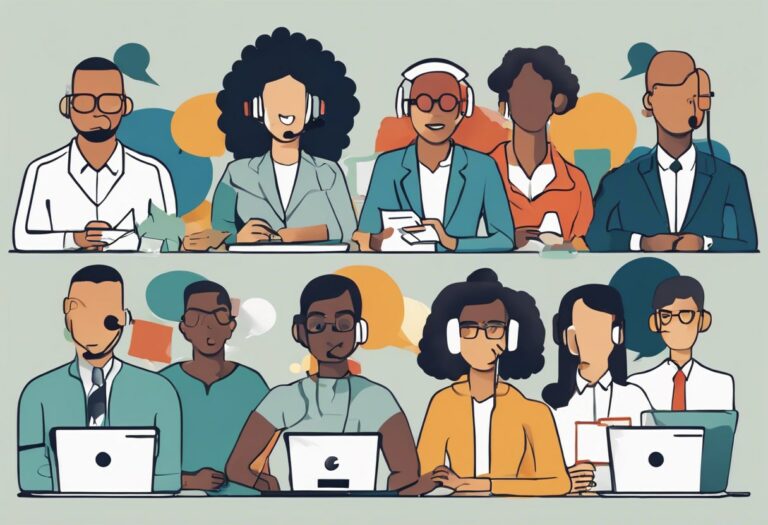10 Other Ways to Say “Thank You for Calling”

Saying “thank you for calling” is a common way to show appreciation, but it can sometimes feel repetitive.
This article introduces ten different phrases you can use instead to keep your emails fresh and engaging. Each alternative is explained to help you understand when and why to use them, keeping your message both polite and professional.
Is It Professional to Say “Thank You for Calling”?
Yes, saying “thank you for calling” is considered professional, formal or informal depending on the context, and always polite. This phrase is a courteous way to end phone calls, making the caller feel appreciated and valued. It’s suitable in almost any professional setting, including customer service, business negotiations, and casual professional interactions.
Whether you’re talking to clients, colleagues, or stakeholders, this phrase adds a touch of graciousness to your conversation. While primarily used in phone conversations, “thank you for calling” can also be adapted for written communications like emails, especially when acknowledging a prior phone call.
Example:
Dear Alex,
Thank you for discussing our project plans over the phone today. I appreciate your insights and look forward to implementing them.
Thank you for calling and bringing these matters to my attention. Let's keep in touch to ensure everything runs smoothly.
Kind regards,
Emily
Pros:
- It makes the other person feel appreciated.
- Enhances the overall customer experience.
- Builds a positive relationship between parties.
- Is versatile and can be used in various communication mediums.
Cons:
- Can be seen as overly formal in very casual business environments.
- May become repetitive or insincere if overused in frequent communications with the same person.
Sometimes, using an alternative phrase can be beneficial, especially if you’re looking to add variety to your conversations or to tailor your language to fit the tone of the relationship better.
10 Other Ways to Say “Thank You for Calling”
Here are ten common alternatives to “Thank You for Calling” that are perfect for professional emails in a workplace environment:
- Thanks for the call
- I appreciate your call
- Grateful for the conversation
- Thanks for reaching out
- Your call was much appreciated
- Thank you for the phone discussion
- It was good to hear from you
- Appreciate the discussion
- Thankful for your call
- Valued our call
1. Thanks for the call
This alternative is slightly more informal than the original, but still remains professional and polite. It’s best used in emails or messages where there’s an established relationship or ongoing dialogue. This phrase conveys gratitude in a friendly and direct manner.
It’s suitable for emails to colleagues or clients you’ve spoken with multiple times. This phrase works well in both emails and instant messages, especially within teams that favor a more relaxed communication style.
Example:
Dear Mark, Thanks so much for your insights today. Thanks for the call, it helped clarify next steps for us. Best, Sarah
2. I appreciate your call
This synonym offers a tone of gratitude and is more formal than the first. Still highly professional and polite, it subtly emphasizes the value of the caller’s effort to reach out. It’s an excellent choice for communicating with new contacts or in situations that require a touch of formality.
This phrase is an ideal alternative for emails to external stakeholders or clients with whom you’re building a relationship. It conveys respect and appreciation, fitting perfectly in professional email correspondence.
Email sample:
Dear Mrs. Thompson, I appreciate your call earlier regarding our account update. I appreciate your call and look forward to our next steps. Sincerely, Jacob
3. Grateful for the conversation
This alternative emphasizes the content of the call more than the act of calling itself. It’s formal, professional, yet polite. It suits instances where specific, valuable information was exchanged during the call.
This phrase is excellent for follow-up emails after a significant discussion. It works well with senior colleagues, mentors, or industry contacts. This choice enhances the message’s gravity, making it perfect for more formal communication channels.
Here’s an example:
Dear Professor Allen, Our discussion yesterday offered me valuable insights into my research direction. Grateful for the conversation, and I look forward to your continued guidance. Warmest regards, Elena
4. Thanks for reaching out
This synonym is versatile, fitting a range of scenarios from informal to relatively formal. It’s professional and polite, acknowledging the caller’s effort to initiate contact. It’s a great way to start a positive dialogue.
Perfect for messages to potential clients, colleagues from different departments, or external partners. It encourages open communication and sets a welcoming tone for future interactions.
Email example:
Dear Logan, Your feedback on our project proposal was invaluable. Thanks for reaching out; let's discuss further steps soon. Best, Nina
5. Your call was much appreciated
This phrase is more formal and emphasizes appreciation with a strong sense of gratitude. It’s highly professional and remains very polite, suitable for communications where you want to make a positive impression.
Ideal for conversations with clients or stakeholders after a particularly important call. It’s also effective in situations where you want to underscore the significance of the call to your work or project.
Here’s an example:
Dear Mr. Ramirez, Following our productive discussion on the merger, please find attached the revised strategy document. Your call was much appreciated; let's aim for a smooth transition. Kind regards, Fiona
6. Thank you for the phone discussion
This alternative is straightforward and formal, clearly stating gratitude for the discussion itself. It’s very professional and polite, making it appropriate for more formal emails, especially when discussing details or outcomes are important.
Use this when you need to recap or follow up on a call with detailed information. It’s well-suited for emails to supervisors, clients, or team members after a strategic meeting or significant decision-making call.
Email sample:
Dear Chloe, Your input on today's budget allocations was crucial for our decision-making process. Thank you for the phone discussion; I believe we're well on our way to a successful quarter. Best, Liam
7. It was good to hear from you
More informal and personal, this phrase still maintains a professional and polite tone. It’s ideal when you have an established relationship with the caller and want to express a warm sentiment.
This alternative works best for emails to colleagues or clients you’ve known for a while. It’s perfect for business environments that value personal relationships, enhancing a sense of camaraderie and mutual respect.
Example:
Dear Sophie, It was a pleasure catching up and discussing the new project timelines. It was good to hear from you; let's tackle these challenges together. Take care, Oliver
8. Appreciate the discussion
This phrase is professional, formal, yet polite, making it an excellent choice for more serious or detailed calls. It foregrounds the productive nature of the conversation without being overly friendly.
Best used with external parties or higher management following a productive call. It’s also well-suited for emails that aim to continue a discussion with actionable items or further questions.
Email example:
Dear Victor, Our planning session was quite productive, and your insights were greatly valued. Appreciate the discussion, looking forward to progressing with our plans. Regards, Eva
9. Thankful for your call
This synonym leans towards a formal and professional tone but is warm and polite, perfect for expressing gratitude. It’s best when you want to highlight the importance of the call and its impact on your work.
Suitable for emails to mentors, senior management, or important clients, especially after receiving guidance, support, or important information. It conveys profound appreciation and respect.
Here’s an example:
Dear Elena, Your guidance on the project direction has been invaluable. Thankful for your call, your advice has crucially shaped our approach. Best, Tom
10. Valued our call
This alternative is professional, slightly formal, and polite, imparting a sense of significance to the conversation that took place. It’s particularly fitting for emails where you wish to underline the value received from the call.
Excellent for follow-up messages after significant calls with clients, advisors, or team leaders where strategic advice or key decisions were discussed. It acknowledges the contribution of the caller to your projects or goals.
Email sample:
Dear Harrison, The insights you provided today have been pivotal for our project's direction. Valued our call; let's continue to work closely on this. Warm regards, Danielle
Final Thoughts
Choosing the right way to say “thank you for calling” can impact how your professionalism is viewed. The alternatives provided offer a way to maintain respect, show appreciation, and enhance communication in any professional setting. Whether the conversation is formal or informal, there’s a suitable option for every scenario.






